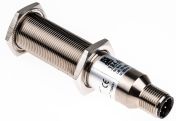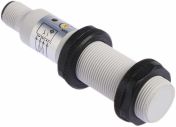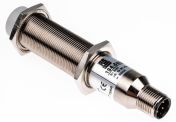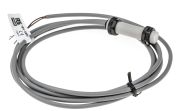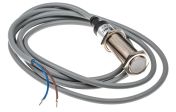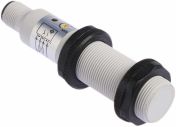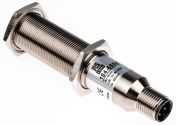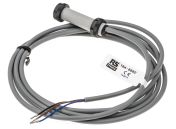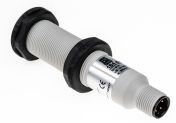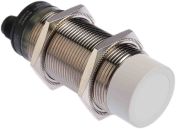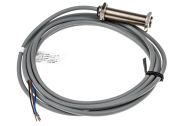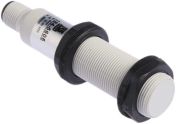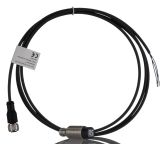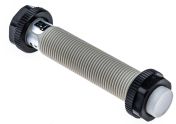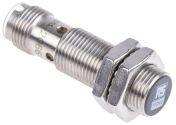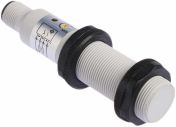Proximity Sensors
A proximity sensor is an electronic device engineered to identify the presence or absence of an object without needing physical contact. These sensors are indispensable for handling fragile or dynamically unstable materials. They operate by detecting changes in a field or return signal within their designated range. Key advantages of proximity sensors include their ability to sense metallic and non-metallic objects, endure extreme temperatures ranging from -50°C to 100°C, and perform high-speed motion detection in environments exposed to oil or water.
To delve deeper into their function and diverse applications, read more on our comprehensive guide to proximity sensors below.
Application of Proximity Sensors
Proximity sensors are integral to various industrial and manufacturing settings, enhancing safety and streamlining inventory processes. Commonly used in automated production lines, these sensors are crucial for object identification, positioning, inspection, and counting tasks. They also play a key role in industrial conveyor systems by detecting parts to facilitate smooth operations.
In the realm of consumer electronics, proximity sensors are essential for enhancing user experiences. For instance, in smartphones, they detect when the device is held close to the user's face during a call, which can help in disabling the screen to prevent unintended touches. Additionally, they are employed as capacitive touch switches, contributing to the functionality and responsiveness of various electronic devices.
Types of Proximity Sensors
Proximity sensors are available in several varieties, each tailored for specific applications, but all based on the common principle of detecting objects and transmitting data through electrical signals within a predefined range.
Here are some common types:
Infrared Sensors (IR Proximity Sensor)
Infrared sensors consist of passive infrared sensors (PIR) and active infrared sensors. PIR sensors utilise pyroelectric infrared sensors in a magnetic lens, which detect changes in the signal between them. Active IR proximity sensors employ an IR LED that emits an infrared beam to an infrared receiver, detecting obstacles that block the infrared radiation.
Inductive Proximity Sensors
Inductive proximity sensors generate an electromagnetic field through an oscillating circuit. Any ferrous metal object, including aluminium, copper, brass, and iron, triggers a change in the oscillation to indicate its presence. This makes them the ideal proximity sensors for quality control in manufacturing.
Capacitive Proximity Sensors
Capacitive distance sensors can detect various shapes and materials, even through non-metallic walls. They are ideal for non-ferrous materials and work best in close-range applications like level-detection and monitoring.
Ultrasonic Proximity Sensors
Ultrasonic sensors emit and receive high-frequency sound waves that can be reflected or absorbed by objects within their range. These sensors are ideal for high-speed and long-distance measurements, such as wind speed, fluid level, and speed through air or water.
Magnetic Proximity Sensors
Magnetic proximity sensors measure the presence or absence of an object using an external magnetic field. The sensor's reed switch is operated by a magnet, activating the sensor when the reed switch is turned ON.
Proximity sensors: Shielded vs Unshielded
Proximity sensors come in two primary types: shielded and unshielded, each suited to different installation environments and applications due to their distinct characteristics.
Shielded Proximity Sensors
These sensors are designed to be flush-mounted in metal environments, allowing for seamless integration without the effects of surrounding metal interfering with their operation. The shielding restricts the sensor's magnetic field to the front of the device, preventing lateral emission. This design minimises the risk of damage from collision with detected objects and is typically more compact, with the sensor's detection surface level with the mounting surface.
Unshielded Proximity Sensors
In contrast, unshielded proximity sensors offer a longer sensing distance—up to 100% greater than their shielded counterparts. This extended range is due to the sensor's head protruding from its housing, allowing a broader and stronger magnetic field. However, this design requires additional space around the sensor to avoid interference from surrounding metals and is more vulnerable to impact damage.
Choosing between shielded and unshielded proximity sensors depends on specific needs such as the required sensing distance, the environmental conditions, and the risk of physical contact with the object being detected.
How to Order Proximity Sensors From RS?
As a trusted supplier, RS offers an extensive range of proximity sensors from leading brands like RS PRO, BALLUFF, Sick, and Telemecanique Sensors.
Business account customers enjoy free delivery on all orders over $40 (excluding GST), with a $10 delivery fee for orders under this amount. For private accounts and guest customers, delivery is free for orders over $80 (excluding GST), while a fee of $12.95 applies to smaller orders.
Our streamlined ordering process ensures that you can easily purchase the right sensors for your needs with efficient delivery options.
Delivery Information for Australia
RS offers efficient delivery services across Australia. Place your order by 5 pm AEST Monday to Friday for next working day delivery of locally stocked items. Please note that some regional areas may experience extended lead times. For orders that require special handling, such as those including hazardous materials or exceeding standard sizes and weights, additional lead times may apply.
For a comprehensive overview of all our delivery options, including exceptions and special services like same-day delivery and consolidated shipments, please visit our delivery information page.
Popular Searches
Related links
- RS PRO Rectangular Proximity Switch 120Vac, IP67
- Telemecanique Sensors Inductive Block Proximity Sensor 2-Wire NO/NC, 20 → 264 V ac/dc
- ifm electronic Inductive Threaded Barrel Proximity Sensor 2 mm Detection 7.5 → 30 V dc
- Pepperl + Fuchs Inductive Block Proximity Sensor 2-Wire NO/NC, 5 → 60 V dc
- Telemecanique Sensors Inductive Threaded Barrel Proximity Sensor 22 mm Detection 20 → 264 V
- SICK Inductive Threaded Barrel Proximity Sensor 8 mm Detection 10 → 30 V dc
- Pepperl + Fuchs Inductive Block Proximity Sensor PNP NO, 10 → 30 V dc
- Honeywell BZE6 Series Plunger Limit Switch IP66 Die Cast Zinc Housing 15A Max

